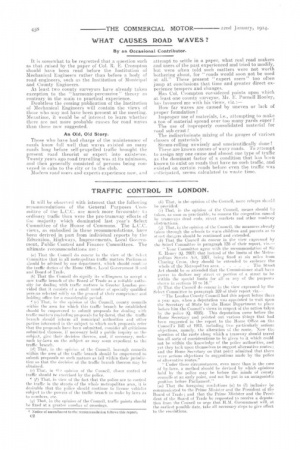TRAFFIC CONTROL IN LONDON.
Page 12

If you've noticed an error in this article please click here to report it so we can fix it.
It will be observed with interest that the following recommendations of the General Purposes Committee of the L.C.C. are much more favourable ta ordinary traffic than were the pro-tramway ellotts of the majority which dominated last year's Select Committee of the House of Commons. The L.C.C. views' as embodied in these recommendations. have been derived in part from individual reports by the Education, Highways, Improvements, Local Government, Public Control and Finance Committees. The ultimate recommendations are :
(a) That tin Council do concur in the view of the Sclect Committee that in all metropolitan traffic matters Parliament
should be advised by one department, which should combine the traffic duties of the Home Office, Local Government Floa id and Board of Trade.
(6) That the Council do signify its willingness to accept a new traffic branch of the Board of Trade as a suitable autho
rity for dealing with traffic matters in Greater London provided that it consists of a small another of specially qualified persons selected soVily on the ground of their competence and holding office for a considerable period.
(e) That, in I he opinion of the Commil, county councils within the area for which this traffic branch he established
should be empowered to submit proposals for dealing with traffic matters (including proposals for by-laws), that the traffic branch should inform all municipal authorities and other parties interested in subject to which -such proposals refer that the proposals have been submitted, consider all criticisms submitted thereon, if necessary hold a public inquiry on the subject, give their decision thereon, and, if necessary, make such by-laws on the subject as may seem expedient to the traffic branch.
(d) That, in the opinion of the Council, borough councils within the area of the traffic branch should be empowered to
submit proposals on such matters as fall within their jurisdiction so that the decision of the traffic branch thereon may be obtained.
(e) That, in tlte [minion of the Council, closer control of traffic should be exercised by the police.
I' V) That, in view of the fact that the police are to control the traffic in the streets of the whole metropolitan area, it is desirable that the police should continue to license vehicles subject to the powers of the traffic branch to make by-laws as to numbers, etc.
(g) That, in the opinion of the Council, traffic points should be fixed at a greater nomixer of crossings. 0) That, in the opinion of the Council, Inure refuges should be provided: That, in the opinion of the Council, means should T:.2, taken, as soon as practicable, to remove the congestion catliwd by tramways dead ends, street markets aud other roadway obstructions.
()) That, in the opinion of the Council, the measures already taken through the schools to warn children and parents as to street dangers should be continued and extended.
(k) That. the Council do concur in the view expressed by the Select Committee in paragraph 128 of their report, viz.— " Your Committee agree with the recommendation of Sir E. Henry (Q. 2907) that instead of the limits of the Metro
politan Streets Act, 1867, being fixed at six miles from Charing Cross, they should be extended to embrace the whole of the Metropolitan area. . . . . The Street Act should be so amended that the Commissioner shall have power to declare any street or portion of a street to be within the special limits for all or any of the purpose„; shown itt sections 10 to 16."
(1) That the Council do concur in the view expressed by the Select Committee in paragraph 169 of their report viz.— " The London County Council had this aspect before them a year ago, wheu a deputation was appointed to wait upon
the Secretary of State for the Home Department to place
before him the Council's views in respect of the action taken by the police (Q. 4985). This deputation came before the Home Secretary and pointed out various things that had been suggested in the report to the Home Office on the Council's Bill of 1912, including two particularly serioug objections, namely, the alteration of the route. Now tho question of the route along which a tramway should travel has all sorts of considerations to be given to it which could
not he within the knowledge of the police authorities, and yet they took upon themselves to suggest alternative routes ; amid the Home Secretary on that point admitted that there were serious objections to suggestions made by the police of alternative routes."
" Coder these circumstances, even more than in the case of by-laws, a method should he devised by which opinions held by the police may be before the minds of county councils at. an early point, and not be put in ant antagonistic position before Parliament." (at) That the foregoing resolutions (a) to (1) iuclusive b0 communicated to the Prime Minister and the President of the Board of Trade; and that the Prime Minister and the President of the Board of Trade be requested to receive a deputatiou from the Council to urge that H.M. Government will, at the earliest possible date, take all necessary steps to give effect to the resolutions.






















